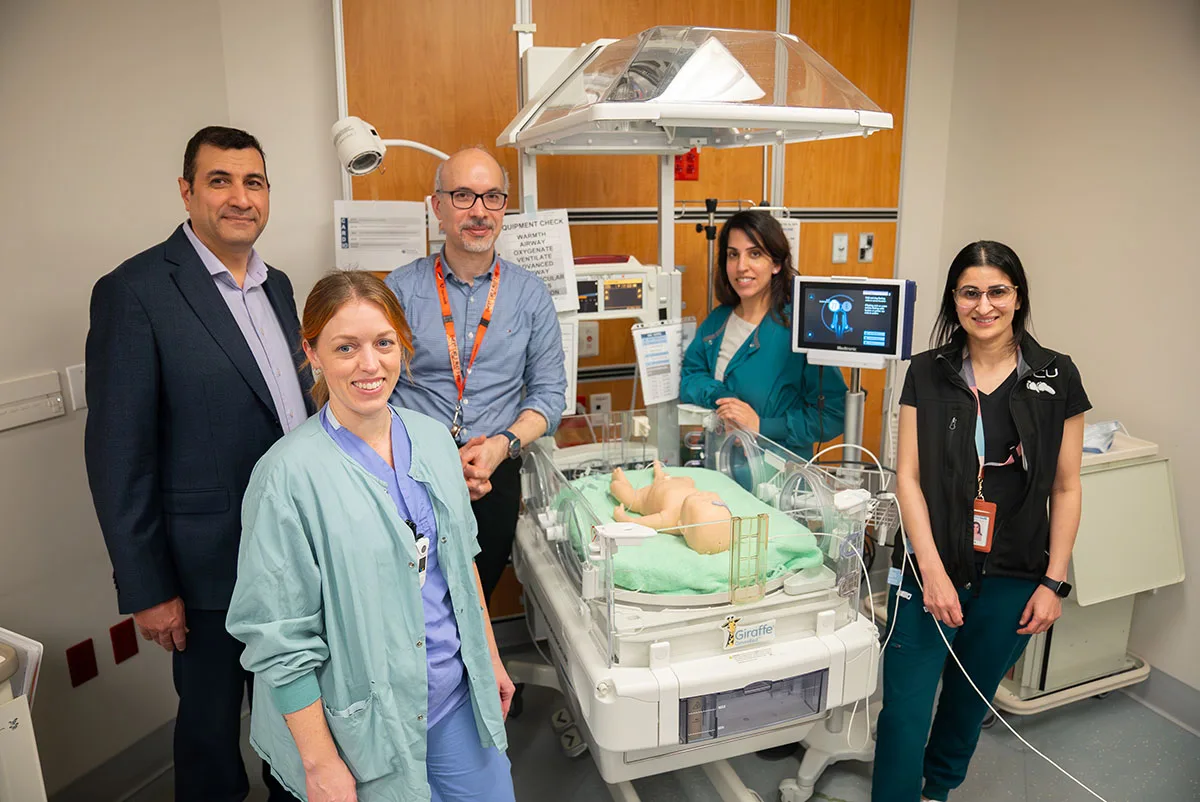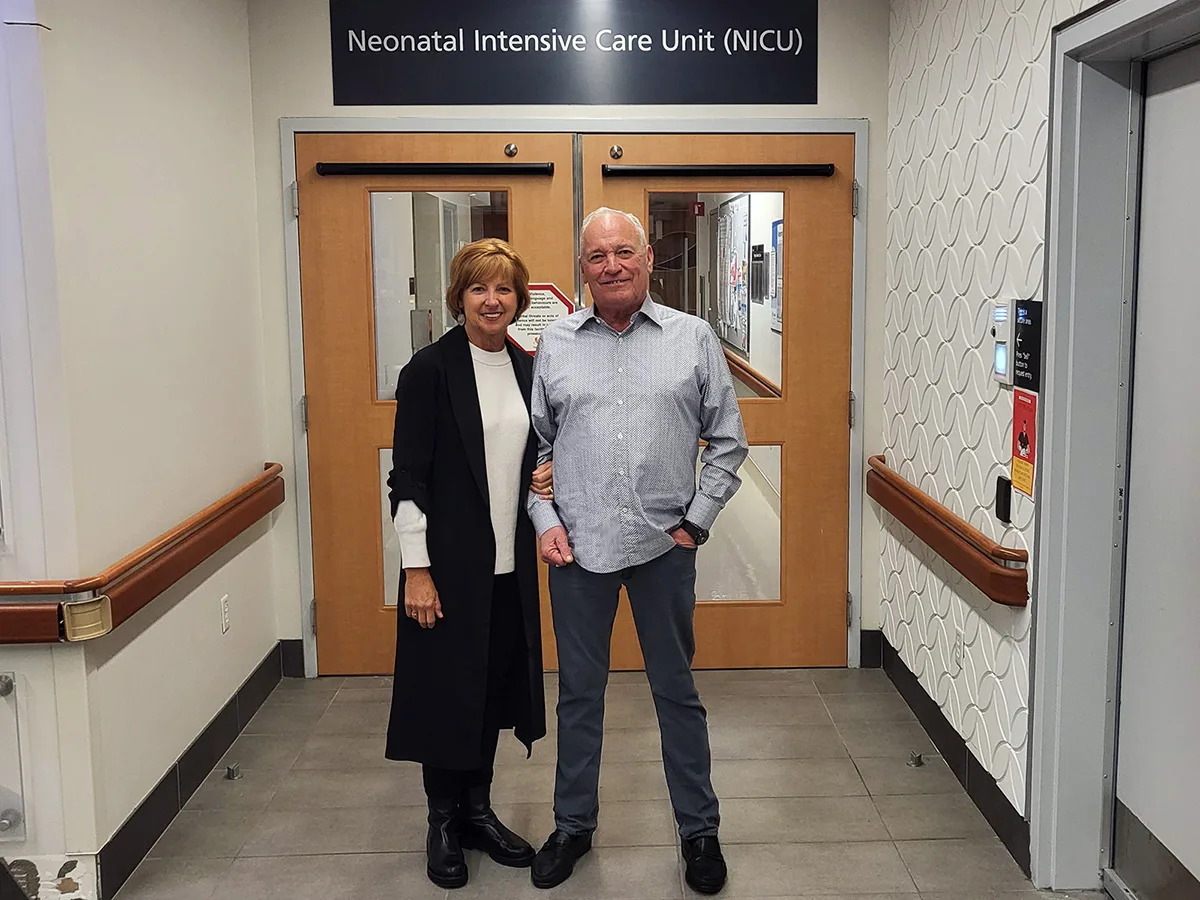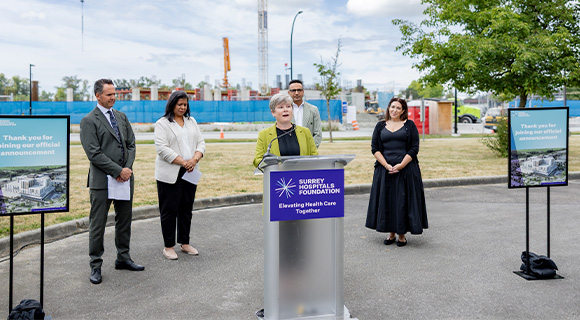
Photo: Surrey Memorial Hospital’s NICU clinicians being trained on the Near Infrared Spectroscopy (NIRS) monitoring devices that the Surrey Hospitals Foundation purchased thanks to donors Ken and Ena McIntosh.
Surrey Hospitals Foundation has recently received a donation from Ken & Ena McIntosh, long-time supporters of the Foundation, to help fund the purchase of four Near Infrared Spectroscopy (NIRS) monitoring devices for the neonatal intensive care unit (NICU) at Surrey Memorial Hospital (SMH).
The NIRS technology is relatively new in the NICU sphere and Surrey Memorial Hospital is among the first hospitals in British Columbia to use the NIRS monitoring devices to help pediatric clinicians conduct non-invasive and continuous real-time monitoring of tissue oxygenation saturation in cerebral tissue and other organs in high-risk babies in the NICU.
“Our NICU department currently has a bed capacity of 32 and on average one out of eight neonates is in critical condition and at risk of developing a central nervous system injury,” explains Dr. Samer Yousfi, a pediatrician and neonatologist at Surrey Memorial Hospital. “The innovative near-infrared spectroscopy monitoring devices will enable our pediatric clinicians to better monitor high-risk babies and will tremendously contribute to improved quality of care at our NICU.”
Nervous System Risk for Neonates
New born babies (neonates) admitted to the NICU are at a higher risk of central nervous system complications and are particularly susceptible to brain injuries as the brain undergoes rapid development during the last trimester of pregnancy.
Currently, and to a large degree, neonatal brain monitoring relies on bedside medical staff’s assessment using equipment that monitor other vitals such as blood pressure, heart rate, and pulse oximetry, which are important to assess the condition of babies, but do not directly assess brain oxygenation and perfusion, and cranial ultrasound or MRI don’t allow for continuous monitoring.
The NIRS technology will provide a more complete and accurate picture and allows for real-time, continuous and non-invasive readings of blood oxygen levels and oxygen consumption in the brain, tissues and other specific organs and can alert clinicians to changes in the patient’s condition, enabling them to make interventions earlier if necessary.
“This generous gift will help to ensure our dedicated neonatal and pediatric teams have the latest technology to provide the best care to the most vulnerable members of our community,” says Janet Murphy, Executive Director, Maternal, Infant, Child and Youth, Fraser Health. “We recognize and appreciate the role of philanthropy as we expand our infrastructure for maternity, neonatal, pediatric and women’s health at Surrey Memorial Hospital.”
The Regional Hub of Care for our Children
Surrey Memorial Hospital is the Fraser Health region’s largest provider of newborn and pediatric healthcare and is a high-risk birthing centre, which sees more than 50,000 visits per year. The Fraser Health region accounts for 41 per cent of BC’s children and youth at almost 400,000. In 2022-23, 4,776 babies were born at Surrey Memorial Hospital.
“We are so grateful to Ken and Ena McIntosh for their generous contribution of $60,000 to help us purchase these much needed NIRS equipment for the NICU department at Surrey Memorial Hospital,” says Maria Faccio, Chief Development Officer of the Surrey Hospitals Foundation. “The funds also enable Dr. Yasser Elsayed, a world-leading neonatologist and specialist in neonatal hemodynamics with targeted echocardiography, to train our NICU nurses and pediatric clinicians at SMH on the NIRS technology.”

Photo: Ken and Ena McIntosh
“We have been supporters of the Surrey Hospitals Foundation for many years and in November 2023 our twin granddaughters were born prematurely at Surrey Memorial Hospital and spent three weeks at the NICU department and received such exceptional care from the NICU staff,” says Ken McIntosh. “We learned from Dr. Yousfi the importance of bringing the NIRS technology to SMH’s NICU and his desire to be provincial leaders so we were more than happy to contribute and help other babies who can benefit from this technology.”


